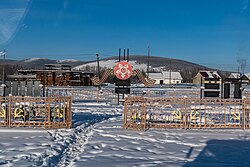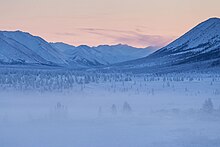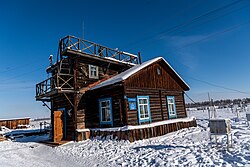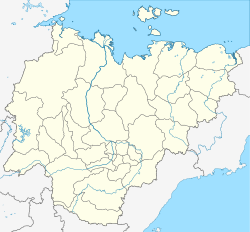Oymyakon
Oymyakon
Оймякон | |
|---|---|
| Other transcription(s) | |
| • Yakut | Өймөкөөн |
 | |
| Coordinates: 63°27′39″N 142°47′09″E / 63.46083°N 142.78583°E | |
| Country | Russia |
| Federal subject | Sakha Republic |
| Administrative district | Oymyakonsky District |
| Elevation | 745 m (2,444 ft) |
| Population | |
• Total | 462 |
• Estimate (5 February 2018)[Videos 1] | 500–900 |
| • Municipal district | Oymyakonsky Municipal District |
| Time zone | UTC+10 (MSK+7 |
| Postal code(s)[3] | 678752 |
| Dialing code(s) | +7 41154 |
| OKTMO ID | 98639405101 |
Oymyakon[a] is a rural locality (a selo) in Oymyakonsky District of the Sakha Republic, Russia, located in the Yana-Oymyakon Highlands, along the Indigirka River, 30 km (19 mi) northwest of Tomtor on the Kolyma Highway. Oymyakon is the coldest permanently inhabited human settlement on Earth,[4][5] with an average winter temperature of around −50 °C (−58 °F).[6]
Etymology
[edit]The settlement is named after the Oymyakon River, whose name reportedly comes from the Even word kheium, meaning "unfrozen patch of water; place where fish spend the winter".[7] However, another source states that the Even word heyum (hэjум, хэюм; kheium may be a misspelling), which means "frozen lake", may be where it gets its name.[8]
Geography
[edit]Oymyakon has two main valleys beside it. These valleys trap wind inside the town and create a colder climate.[9] The temperatures here are extremely cold for most of the year, and it snows frequently in spring and autumn, but rarely in summer and winter, due to the Siberian High in winter, and temperatures being commonly above 0 °C (32 °F) in summer. Schools are closed if it is colder than −55 °C (−67 °F).[10]
History
[edit]
During World War II, an airfield was built in the district of Aeroport, for the Alaska-Siberian (ALSIB) air route, used to ferry American Lend-Lease aircraft to the Eastern Front.[11]
Oymyakon is located near the historic Road of Bones.[12]
Over the last few decades, the population of Oymyakon has shrunk significantly. The village had a peak population of roughly 2,500 inhabitants, but that number has dwindled to fewer than 900 in 2018.[Videos 1]
The local economy is mostly fur trading and ice fishing.[13]
Religion
[edit]
Most inhabitants of Oymyakon are either Orthodox Christians or non-religious. Aiyy Faith and Shamanism also have a presence in the area.
Climate
[edit]

With an extreme subarctic climate (Köppen climate classification Dfd, Trewartha climate classification Ecle), Oymyakon is known as one of the places considered the Northern Pole of Cold, the other being the town of Verkhoyansk, located 629 km (391 mi) away by air. The weather station is in a valley between Oymyakon and Tomtor. The station is at 750 m (2,460 ft) above sea level and the surrounding mountains, at 1,100 m (3,600 ft), cause cold air to pool in the valley: in fact, recent studies show that winter temperatures in the area increase with altitude by as much as 10 °C (18 °F).[clarification needed][14] The ground is permanently frozen (continuous permafrost).
There is a monument built around the town square commemorating an unofficial reading in January 1924 of −71.2 °C (−96.2 °F). This was shown on the Australian program 60 Minutes in a 2012 documentary.[15] On 6 February 1933, a temperature of −67.7 °C (−89.9 °F) was recorded at Oymyakon's weather station.[16][17] This was almost the coldest officially recorded temperature in the Northern Hemisphere (Verkhoyansk had recorded −67.8 °C (−90.0 °F) on 5 and 7 February, 1892). Only Antarctica and Greenland have recorded lower official temperatures (the lowest being −89.2 °C (−128.6 °F), recorded at Vostok Station on 21 July 1983).[18][19] The unofficial record cold temperature is roughly 8 °C (14 °F) warmer than the sublimation point of carbon dioxide.
During some years the temperature drops below 0 °C (32 °F) in late September and remains below freezing until mid-April. Oymyakon has never recorded an above-freezing temperature between 26 October and 16 March inclusive.[20] In Oymyakon sometimes the average minimum temperature for December, January, and February falls below −50 °C (−58 °F): in the record coldest month of January 1931 the monthly mean was −54.1 °C (−65.4 °F).[21] Sometimes summer months can also be quite chilly, but in June, July, and August, the temperature has never dropped below −14 °C (7 °F), while in June and July, the temperature has never dropped below −10 °C (14 °F). Oymyakon and Verkhoyansk are the only two permanently inhabited places in the world that have recorded temperatures below −60 °C (−76 °F) for every day in January.[22][23] By the contrast July is the month where every day has had temperatures above 30 °C (86 °F). Every day of the year has a record low below freezing, with 9 July having the highest record low at −1.5 °C (29.3 °F). In contrast, 4 January has the lowest record high at −27.9 °C (−18.2 °F).
Although winters in Oymyakon are long and extremely cold, summers are mild to warm, sometimes hot, with cool to cold summer nights. The warmest month on record was July 2022 with an average temperature of 19.3 °C (66.7 °F).[24] In June, July, and August, temperatures over 30 °C (86 °F) are not rare during the day. On 7 July 2022, the warmest night on record was observed, with an overnight minimum of 18.6 °C (65.5 °F).[25][26] On 28 July 2010, Oymyakon recorded a record high temperature of 34.6 °C (94.3 °F),[27] yielding a temperature range of 102.3 °C (184.1 °F). Verkhoyansk, Yakutsk, Delyankir, Tegyulte, and Fort Vermilion, Canada are the only other known places in the world that have a temperature amplitude higher than 100 °C (180 °F).[citation needed] Fort Yukon, Alaska, falls 1 degree C short of this threshold. Also, Oymyakon is tied with Verkhoyansk for the highest temperature amplitude in the world, and Verkhoyansk is tied with Fort Yukon for the warmest temperature above the Arctic Circle ever (38 degrees C; 100 degrees F).
The climate is quite dry, but as average monthly temperatures are below freezing for seven months of the year, substantial evaporation occurs only in summer months. Summers are much wetter than winters. Due to its harsh winters, the plant hardiness zone in Oymyakon is 0a. A small number of trees such as the Dahurian larch can still grow nonetheless.
| Climate data for Oymyakon (1991–2020, extremes 1891–present) | |||||||||||||
|---|---|---|---|---|---|---|---|---|---|---|---|---|---|
| Month | Jan | Feb | Mar | Apr | May | Jun | Jul | Aug | Sep | Oct | Nov | Dec | Year |
| Record high °C (°F) | −16.6 (2.1) |
−12.5 (9.5) |
3.8 (38.8) |
11.7 (53.1) |
26.2 (79.2) |
31.7 (89.1) |
34.6 (94.3) |
32.9 (91.2) |
23.7 (74.7) |
11.0 (51.8) |
−2.1 (28.2) |
−6.0 (21.2) |
34.6 (94.3) |
| Mean daily maximum °C (°F) | −42.1 (−43.8) |
−35.8 (−32.4) |
−19.8 (−3.6) |
−3.0 (26.6) |
9.7 (49.5) |
20.0 (68.0) |
23.0 (73.4) |
18.5 (65.3) |
9.1 (48.4) |
−8.3 (17.1) |
−30.2 (−22.4) |
−41.9 (−43.4) |
−8.4 (16.9) |
| Daily mean °C (°F) | −45.7 (−50.3) |
−42.2 (−44.0) |
−30.2 (−22.4) |
−12.7 (9.1) |
3.5 (38.3) |
12.7 (54.9) |
15.3 (59.5) |
10.8 (51.4) |
2.5 (36.5) |
−13.8 (7.2) |
−34.4 (−29.9) |
−45.0 (−49.0) |
−14.9 (5.2) |
| Mean daily minimum °C (°F) | −49.3 (−56.7) |
−47.6 (−53.7) |
−39.2 (−38.6) |
−22.9 (−9.2) |
−3.5 (25.7) |
4.4 (39.9) |
6.9 (44.4) |
3.2 (37.8) |
−3.3 (26.1) |
−19.2 (−2.6) |
−38.8 (−37.8) |
−48.3 (−54.9) |
−21.5 (−6.7) |
| Record low °C (°F) | −65.4 (−85.7) |
−67.7 (−89.9) |
−60.6 (−77.1) |
−46.4 (−51.5) |
−28.9 (−20.0) |
−9.7 (14.5) |
−9.3 (15.3) |
−17.1 (1.2) |
−25.3 (−13.5) |
−47.6 (−53.7) |
−62.2 (−80.0) |
−62.8 (−81.0) |
−67.7 (−89.9) |
| Average precipitation mm (inches) | 6 (0.2) |
7 (0.3) |
5 (0.2) |
5 (0.2) |
15 (0.6) |
39 (1.5) |
46 (1.8) |
38 (1.5) |
24 (0.9) |
13 (0.5) |
13 (0.5) |
7 (0.3) |
218 (8.6) |
| Average extreme snow depth cm (inches) | 24 (9.4) |
28 (11) |
30 (12) |
24 (9.4) |
3 (1.2) |
0 (0) |
0 (0) |
0 (0) |
0 (0) |
6 (2.4) |
15 (5.9) |
20 (7.9) |
30 (12) |
| Average rainy days | 0 | 0 | 0.03 | 0.4 | 10 | 17 | 17 | 18 | 13 | 1 | 0 | 0 | 76 |
| Average snowy days | 23 | 23 | 16 | 10 | 9 | 1 | 0.2 | 0.3 | 9 | 21 | 23 | 20 | 156 |
| Average relative humidity (%) | 77 | 76 | 73 | 68 | 60 | 60 | 66 | 72 | 74 | 80 | 78 | 75 | 72 |
| Mean monthly sunshine hours | 35.4 | 127.5 | 255.5 | 314.2 | 287.7 | 317.8 | 308.7 | 236.0 | 146.8 | 114.4 | 62.8 | 14.3 | 2,221.1 |
| Source 1: Погода и Климат,[28][29] World Meteorological Organization (February record low)[30] (November record low)[31] | |||||||||||||
| Source 2: NOAA[32] | |||||||||||||

See also
[edit]Notes
[edit]- ^ Russian: Оймяко́н, pronounced [ɐjmʲɪˈkon]; Yakut: Өймөкөөн, Öymököön, IPA: [øjmøˈkøːn]
References
[edit]- ^ Russian Federal State Statistics Service (2011). Всероссийская перепись населения 2010 года. Том 1 [2010 All-Russian Population Census, vol. 1]. Всероссийская перепись населения 2010 года [2010 All-Russia Population Census] (in Russian). Federal State Statistics Service.
- ^ "Об исчислении времени". Официальный интернет-портал правовой информации (in Russian). 3 June 2011. Retrieved 19 January 2019.
- ^ Почта России. Информационно-вычислительный центр ОАСУ РПО. (Russian Post). Поиск объектов почтовой связи (Postal Objects Search) (in Russian)
- ^ Jennings, Ken (10 September 2018). "This Is the Coldest Permanently Inhabited Place on Earth". Condé Nast Traveler.
- ^ "World's Coldest Village Drops To −80° & The Photos Are Spectacular". InspireMore.com. 16 January 2018. Retrieved 19 January 2018.
- ^ Bonaccorso, Nicole (21 December 2022). "Breathtaking Photos Of The Coldest City In The World". weather.com. The Weather Company. Retrieved 7 October 2023.
Winter temperatures in Oymyakon, Russia, average minus 58 degrees Fahrenheit (minus 50 degrees Celsius).
- ^ Pospelov, Evgeniy Mikhaylovich (1998). Географические названия мира (in Russian). Moscow: Русские словари. p. 307. ISBN 5892160297.
- ^ Tsintsius, V. I. (1977), Сравнительный словарь тунгусо-маньчжурских языков : материалы к этимологическому словарю (in Russian), vol. 2, Leningrad: Nauka, p. 361
- ^ Bijal P. Trivedi (12 May 2004). "Life Is a Chilling Challenge in Subzero Siberia". National Geographic Channel. Archived from the original on 17 May 2004.
- ^ Visiting the coldest town in the world - Chilling Out - 60 Minutes Australia (YouTube video). 20 June 2018. Event occurs at 12:18.
- ^ Lebedev, Igor (1997). Aviation Lend-Lease to Russia. Nova Publishers. pp. 44–49.
- ^ Andrew Higgins (22 November 2020). "Along Russia's 'Road of Bones,' Relics of Suffering and Despair". The New York Times. Retrieved 15 June 2021.
- ^ Interesting, Sometimes (17 July 2011). "The Coldest Inhabited Place on Earth: Oymyakon, Russia". Sometimes Interesting.
- ^ "International Glaciological Society (IGS)" (PDF). Igsoc.org. 13 February 2012. Retrieved 10 March 2015.
- ^ "Chilling Out – Visiting the Coldest Town in the World". 60 Minutes. 20 June 2018 – via YouTube.
- ^ N.A. Stepanova. "On the Lowest Temperatures on Earth" (PDF). Docs.lib.noaa.gov. Archived from the original (PDF) on 3 March 2016. Retrieved 10 March 2015.
- ^ Christopher C. Burt. "The Coldest Places on Earth". Weather Underground. Archived from the original on 19 March 2016.
- ^ "World:Lowest Temperature". World Meteorological Organization. Archived from the original on 16 June 2010. Retrieved 4 February 2014.
- ^ "Global Weather & Climate Extremes". World Meteorological Organization. Retrieved 4 February 2014.
- ^ "Погода и Климат - Климатический монитор: погода в Оймяконе". Pogodaiklimat.ru. Retrieved 10 March 2015.
- ^ "Погода и Климат - Климатический монитор: погода в Оймяконе". Pogodaiklimat.ru. Retrieved 24 April 2021.
- ^ "Погода и Климат - Климатический монитор: погода в Оймяконе". Pogodaiklimat.ru. Retrieved 10 March 2015.
- ^ "Погода и Климат - Климатический монитор: погода в Верхоянске". Pogodaiklimat.ru. Retrieved 10 March 2015.
- ^ "Погода и Климат - Климатический монитор: погода в Оймяконе". Pogoda.ru.net. Retrieved 10 March 2015.
- ^ "24688: Ojmjakon (Russia)". ogimet.com. OGIMET. 7 July 2022. Retrieved 8 July 2022.
- ^ "Oymyakon is famous for having the record of the lowest temperature in an inhabited village with -67.7C on 6 February 1933. 89 years later, today 8 July an opposite record was set: its warmest night on record with an overnight minimum of 18.6C (and almost 23 hours were "tropical")". Twitter.com. Retrieved 18 July 2022.
- ^ "Погода и Климат - Климатический монитор: погода в Оймяконе". Pogoda.ru.net. Retrieved 10 March 2015.
- ^ "Погода и Климат - Климат Оймякона". Pogodaiklimat.ru. Archived from the original on 17 March 2015. Retrieved 8 November 2021.
- ^ "Погода в Оймяконе. Температура воздуха и осадки. Февраль 2014 г." Pogodaiklimat.ru. Retrieved 10 February 2014.
- ^ "Asia: Lowest Temperature". WMO. Archived from the original on June 16, 2010. Retrieved June 19, 2010.
- ^ "Lowest Temperature November". Archived from the original on June 16, 2010. Retrieved June 19, 2010.
- ^ "Oymyakon 1991–2020". NOAA. Retrieved 30 October 2023.
Videos
[edit]- ^ a b "Visite du village le plus froid du monde". YouTube (in French). Konbini News. 5 February 2018. Retrieved 27 October 2018.



